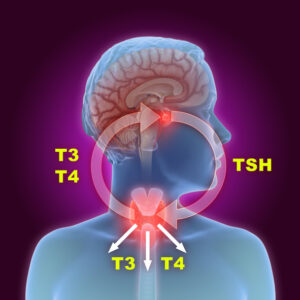THYROID STIMULATING HARMONE

DEFINITION :
“Thyroid Stimulating Hormone (TSH) is a hormone produced by the pituitary gland, which is located at the base of the brain. TSH plays a crucial role in regulating the function of the thyroid gland, which is responsible for producing hormones that control the body’s metabolism.”
TSH stimulates the thyroid gland to produce two main hormones:
- Thyroxine (T4): This is the primary hormone produced by the thyroid gland. T4 is converted into the more active form, triiodothyronine (T3), in various tissues of the body.
- Triiodothyronine (T3): This is the active form of thyroid hormone that is primarily responsible for regulating metabolism and other essential functions in the body.
NORMAL LEVEL OF TSH HARMONE :
the general reference range for TSH is:
- Normal range: 0.4 to 4.0 milliunits per liter (mU/L)
ABNORMAL TSH LEVEL MAY INDICATE :
Here’s a breakdown of what different TSH levels may indicate:
- Low TSH (below 0.4 mU/L):
- This may indicate hyperthyroidism (overactive thyroid), where the thyroid is producing too much hormone (T3 and T4), causing the pituitary to reduce TSH production.
- Normal TSH (0.4 to 4.0 mU/L):
- This is considered a healthy level, indicating that the thyroid is functioning properly and producing adequate thyroid hormones.
- High TSH (above 4.0 mU/L):
- This may indicate hypothyroidism (underactive thyroid), where the thyroid is not producing enough hormone (T3 and T4), leading the pituitary to increase TSH production in an attempt to stimulate the thyroid gland.
MECHANISM OF ACTION TSH HARMONE :
The mechanism of action of Thyroid Stimulating Hormone (TSH) primarily involves the regulation of thyroid gland activity, which in turn controls the production of thyroid hormones (T3 and T4). Here’s how TSH works:
1. TSH Binds to TSH Receptors on Thyroid Cells
- TSH is released by the pituitary gland into the bloodstream. When it reaches the thyroid gland, it binds to specific receptors on the surface of thyroid follicular cells. These receptors are known as TSH receptors (or TSHR).
2. Activation of Intracellular Signaling Pathways
- Upon binding to the TSH receptor, the TSH molecule activates an intracellular signaling cascade. This mainly involves the activation of adenylyl cyclase, which converts ATP into cyclic AMP (cAMP). The increase in cAMP levels activates protein kinase A (PKA).
- PKA activates a variety of cellular processes that promote thyroid hormone production and secretion.
3. Synthesis and Release of Thyroid Hormones (T3 and T4)
- The activation of the TSH signaling pathway increases the production and release of two major thyroid hormones:
- Thyroxine (T4): This is the primary hormone produced by the thyroid gland.
- Triiodothyronine (T3): This is the more active form of thyroid hormone, which is synthesized from T4 by deiodinase enzymes in peripheral tissues.
- TSH stimulates the thyroid to:
- Increase iodide uptake from the bloodstream.
- Enhance iodine organification (incorporation of iodine into thyroid hormones).
- Promote the synthesis of thyroglobulin, a protein that binds to thyroid hormones.
- Stimulate the release of T3 and T4 into the bloodstream.
4. Negative Feedback Regulation
- The levels of T3 and T4 in the bloodstream are regulated through a negative feedback loop. When T3 and T4 levels rise, they act on the hypothalamus and the pituitary gland to inhibit further secretion of TSH. This helps maintain thyroid hormone levels within a normal range, preventing excessive or insufficient thyroid hormone production.
EFFECT OF THYROID HARMONE :
Here’s a detailed look at the effects of thyroid hormones:
1. Metabolism Regulation
- Increased Metabolic Rate: Thyroid hormones increase the overall metabolic rate, meaning they help the body produce energy from food at a faster rate. This influences how quickly the body burns calories, and can impact weight.
- Heat Production: They help regulate body temperature by stimulating heat production in tissues (thermogenesis). This is why people with hyperthyroidism (high thyroid hormone levels) often feel warm and may sweat more, while those with hypothyroidism (low thyroid hormone levels) may feel cold and sluggish.
2. Growth and Development
- Normal Growth: In children, thyroid hormones are essential for normal physical growth and development. They stimulate the growth of bones, cartilage, and muscles.
- Cognitive Development: In infants and children, thyroid hormones are crucial for brain development. Deficiency of thyroid hormone during pregnancy or early childhood can lead to developmental delays and intellectual disabilities.
3. Cardiovascular Effects
- Heart Rate: Thyroid hormones increase heart rate and cardiac output. Elevated levels of thyroid hormones (as in hyperthyroidism) can lead to tachycardia (fast heart rate), while low levels (hypothyroidism) can lead to bradycardia (slow heart rate).
- Blood Pressure: Thyroid hormones can increase the sensitivity of the cardiovascular system to catecholamines (like adrenaline), leading to increased blood pressure, especially in hyperthyroidism.
4. Nervous System Effects
- Cognitive Function: Thyroid hormones are important for normal brain function, influencing mood, memory, and concentration. An imbalance can lead to symptoms like depression, anxiety, or difficulty concentrating (more common in hypothyroidism) or irritability and restlessness (more common in hyperthyroidism).
- Nerve Impulse Conduction: Thyroid hormones increase the speed of nerve impulse conduction, which can impact reflexes and muscle coordination.
5. Musculoskeletal Effects
- Muscle Strength: Thyroid hormones influence muscle strength and tone. Low levels of thyroid hormones (hypothyroidism) can lead to muscle weakness and stiffness, while high levels (hyperthyroidism) can cause muscle wasting and weakness over time.
- Bone Health: Thyroid hormones regulate bone growth and remodeling. An imbalance, especially over long periods, can affect bone density. For instance, excessive thyroid hormone levels can increase bone resorption, potentially leading to osteoporosis.
6. Gastrointestinal Effects
- Digestive Function: Thyroid hormones increase the rate of digestion and gut motility. Low levels of thyroid hormones (hypothyroidism) can lead to constipation, while excessive thyroid hormones (hyperthyroidism) can result in diarrhea or more frequent bowel movements.
7. Reproductive System
- Menstrual Cycle: Thyroid hormones are involved in regulating the menstrual cycle. Hypothyroidism can cause irregular or heavy periods, while hyperthyroidism can lead to lighter or absent periods, and may impact fertility.
- Fertility: Both hyperthyroidism and hypothyroidism can cause infertility due to the disruption of ovulation and other hormonal imbalances.
8. Cholesterol and Lipid Metabolism
- Lipid Metabolism: Thyroid hormones play a role in regulating the levels of cholesterol and other lipids in the blood. Low thyroid hormone levels (hypothyroidism) can lead to elevated cholesterol levels, while normal thyroid function helps maintain healthy lipid levels.
9. Liver Function
- Liver Metabolism: Thyroid hormones regulate various enzymes in the liver, influencing the metabolism of fats, proteins, and carbohydrates.
10. Immune System
- Modulation of Immune Response: Thyroid hormones influence immune function. For example, hypothyroidism may lead to an increased risk of certain autoimmune disorders, while hyperthyroidism may also alter immune responses, sometimes leading to autoimmune thyroid disease (e.g., Graves’ disease).

